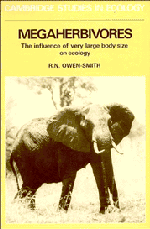Book contents
- Frontmatter
- Contents
- Preface
- 1 Prologue
- 2 Morphology, evolutionary history and recent distribution
- 3 Food and other habitat resources
- 4 Space–time patterns of habitat use
- 5 Body size and nutritional physiology
- 6 Body size and feeding ecology
- 7 Social organization and behavior
- 8 Life history
- 9 Body size and sociobiology
- 10 Body size and reproductive patterns
- 11 Demography
- 12 Community interactions
- 13 Body size and population regulation
- 14 Body size and ecosystem processes
- 15 Late Pleistocene extinctions
- 16 Conservation
- 17 Epilogue: the megaherbivore syndrome
- Appendixes
- References
- Index
8 - Life history
Published online by Cambridge University Press: 01 June 2011
- Frontmatter
- Contents
- Preface
- 1 Prologue
- 2 Morphology, evolutionary history and recent distribution
- 3 Food and other habitat resources
- 4 Space–time patterns of habitat use
- 5 Body size and nutritional physiology
- 6 Body size and feeding ecology
- 7 Social organization and behavior
- 8 Life history
- 9 Body size and sociobiology
- 10 Body size and reproductive patterns
- 11 Demography
- 12 Community interactions
- 13 Body size and population regulation
- 14 Body size and ecosystem processes
- 15 Late Pleistocene extinctions
- 16 Conservation
- 17 Epilogue: the megaherbivore syndrome
- Appendixes
- References
- Index
Summary
Introduction
As animals grow and age they pass through different functional stages in terms of their social relations and contribution to reproduction. These stages may be subdivided as follows (i) infancy and juvenilehood – the period of complete or partial dependence on the mother for sustenance and protection; (ii) adolescence and subadulthood – the early period of independence from the mother, through attainment of physiological sexual maturity; (iii) adulthood – the period following attainment of full social and sexual maturity. Interest lies in the timing of these stages, and in the changing behavioral patterns of animals as they pass through each stage.
Infancy and juvenilehood
This period commences with birth. During the early neonatal period the offspring is completely dependent upon its mother for sustenance in the form of milk. During later infancy the offspring starts supplementing its milk intake with vegetation, but it is some time before nursing ceases and weaning is complete. By use of the term infancy I imply the period during which the young animal could not survive if separated from its mother. Juvenilehood refers to the period of partial dependency on the mother for perhaps some food supplementation, or at least protection from predation. In most species the juvenile period ends when the young animal is driven away by the mother around the time of birth of the next progeny. However, in some species older offspring may remain associated with the mother and her companions through adolescence.
- Type
- Chapter
- Information
- MegaherbivoresThe Influence of Very Large Body Size on Ecology, pp. 133 - 159Publisher: Cambridge University PressPrint publication year: 1988

